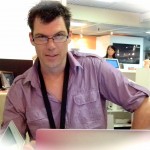At Mipcom, the global market for entertainment content across all platforms, Ruby TV catches up with five Australian industry heavies for their news and insights on the business, the market and the future of television. With Andrew Ogilvie (CEO, Electric Pictures), Joe Connor (CEO, Renegade), Marcus Gillezeau (Executive Producer, Firelight), Chris Oliver-Taylor (General Manager, Matchbox Pictures) and Fiona Gilroy (Content Sales & Acquisitions Director, Flame Distribution).
When did you first come to MIP and in what context?
AO: I first came with a project about twenty years ago, sponsored by Screen West.
JC: I’ve come five or six times but before that I came for the advertising festival and the film festival. The first time was really an exploratory trip. I didn’t really know what to expect. Until you come here, you don’t really have any idea of how big the international television market is. Really, it’s an eye opener for any producer who’s trying to get material into the market to come here and see that there’s 15 000 exhibitors and they’ve all got 500 programs and every single of those producers thinks theirs is one of the best programs ever made and they’re all pitching it to broadcasters. I really gives you a perspective on what your programming is like and it teaches you to tailor your program a bit better for broadcasters and for markets and to help you represent your product and make it stand out to all the other product that’s here that must be in the millions of hours.
MG: 2007. I came because I knew I had to come to Mip if I was going to start seriously looking at international co-pros. Screen Australia also very kindly gave me a grant, which helped.
CO-T: I joined Matchbox a year ago. Before that I was at the ABC and my job didn’t require me to come to Mip so it’s my first time. But I have been to all the big festivals around the world and they’re all the same. I’ve got a clear reason for being here and it’s lucky- the big backing of NBC and with Matchbox’s stand in Screen Australia allows you to get the meetings you want to get and allows you to be quite focused. It’s a wonderful melting of minds. I love Edinburgh TV festival because you bring all that creative power in the one place and you get a similar sense here. It’s a bit broader here but you get that similar feel that if you want to be in TV, you need to be in Mipcom.
FG: I came for the first time as Content Sales Manager with SBS and that would have been 1992.
How has the festival changed?
AO: Not a lot in terms of how it looks, how it’s laid out, how it works. Obviously the content that people are looking for that they’re distributing has changed with fashion. It is obviously bigger than before, I can’t remember there being exterior exhibitions, the Riviera at the back didn’t exist, there were no tents-it was smaller. But the vibe was much the same…
FG: I believe I’ve been to around 30 MipTV’s and Mipcoms and actually nothing has really changed although more independent producers come these days, which is a really positive thing. The way of doing business at the market is just the same in my view – it’s about building relationships and hearing first hand what buyers are looking for and responding to that. I think even with emails and phone calls nothing can beat meeting someone face to face.
How has the industry changed?
AO: Quite dramatically. I’ve worked in television my entire career and we’ve adapted to changing fashion. We’ve developed a reputation for high end, blue chip factual programming-more expensive single hour specials and mini series, but we’re also starting to make some more factual entertainment- lighter programming, longer running.
MG: Not much (since 2007). I guess I’ve always been on the front foot when it comes to multiplatform production or media and distribution across other platforms, so I saw it as pretty natural that the evolution of television was going to be what I just saw up there at the Google presentation which was tremendous and it’s mind blowing- they’re generating advertising revenues equivalent to all of cable television in America, every day. So it’s obvious that there’s a whole lot of other ways that you can generate revenue. I don’t think there’s been a tremendous change as the market was already fractured when I got here in 2007 but there was the big dip 2008-2009, 2010 was terrible for a lot of people- but it was good for us. Then over the years we’ve been able to build up. It’s a hit and miss game and we were luckily that we hit the right person at the right time and got a big great pre-sale for Storm Surfers and that was a great result of Mip and well worth the investment.
FG: Obviously in the 20 years I’ve been coming to Mip, the biggest changes are in variety of platforms audiences can go to access material. It’s inevitable then that the content providers are so much more focused on building a brand for themselves so that they can be found by viewers in amongst the huge number of places any one person can go to consume their content. In turn this has bought about a focus on series because a channel can build up an audience for a slot over time and very “big and noisy” content can stand out from the crowd. So the fight for audience is much more intense and content is the key to that.
What are you doing at MIP this year?
AO: This year I am looking for money for essentially blue chip, I do have a factual entertainment idea but it’s the blue chips that actually still sustain us largely.
JC: We’ve got a slate of projects in factual, drama, comedy and entertainment. RocKwiz, we hope, is about to go into its 11th series- it’s run for nearly ten years on Australian television and it’s quite extraordinary to us that it hasn’t been picked up by a format in other countries, so part of what we’re trying to do here is to convince somebody of the viability and value of a show like RocKwiz for their home territory. RocKwiz has national tours, Christmas shows, merchandise; it’s been a great leader in auxiliaries like CDs, books, web presence, it has a great mailing list… so it’s like the forerunner of a lot of show now where it’s essential to have a web based tail for a broadcast program.
MG: This year one of the first years that I’m doing only a few meetings- catching up with our distributers who have our films and TV shows and actually going to the conference. It’s really nice to be able to dip into the conference- I’ve never been able to do that before because I was running around like a maniac. Like I just went to Toronto Film Festival and I literally didn’t go into a theatre except for Storm Surfers- so it’s really nice just to be here and be able to look around a little but. And we’ve got a couple of projects we are having a couple of meetings for but we’ve got plenty of time so we’re not urgently trying to close gap finance or anything like that which is nice.
C O-T: Matchbox is majorly owned by NBC Universal, so we’ve got a few things I’m doing here. One, a major thing for Matchbox is looking at co-pro partners, particularly in the UK and Canada and I think with the Canadian focus this year at Mipcom it is of interest to us to have a look at how we could be making it work. Both those markets- because I think they have a similar sense of audience so you can make programming that works across those markets and without dismantling your whole editorial basis. Secondly is working with NBC, and spending time with them- their distribution team, their format team because everyone’s in the same place- because NBC are such a big company, their split between London and LA and New York normally. So they’re all here in one place so we all gravitate together. And third is just looking for ideas- looking at what the market is seeking for the next big international hit- so what better place than to find inspiration than here.
FG: We have had a big Mipcom this year with an extra sales person, Katie Stephenson, now working with us out of London and an enormous leap in the volume of content we have to sell this market with some wonderful content out of the UK, New Zealand and Australia. We’re so pleased at how the catalogue is developing with some fantastic filmmakers represented across a broad variety of documentary, factual entertainment and lifestyle genres.
What are your mip goals for 2012?
AO: I’d like to take home some money (smiles). Look I’ve been coming for a long time, I know that attending these markets is part of a long conversation you have with the buyers. In other words you either create some interest in a new idea here, you further the idea you talked about last time or is of interest. It’s very rare that you come here and you take home guaranteed pre-sales from broadcasters. You may well get distribution offers but distribution offers in the case of factual television are not as important. Usually distributors pay less for advances for a number of territories than broadcasters pay for presales for a single territory – which is a reflection of the difference between pre-selling and idea before its produced and selling a completed program. So clearly you’re looking for presales first of all, and for distribution advances/deals as a top up. So I bring projects here at various stages.
JC: I’d like to see us form some good partner relationships- potential co producer; I’d like to see us get one of our formats up with a UK or US network broadcaster- Channel 4/ BBC; I’d like to see RocKwiz turned into an international format. One of those things would be good. We have a great reputation for delivering quality product, for the high end of documentary making, with shows like Immigration Nation and Dirty Business, the show on how mining made Australia; and I think that we’re right to be doing big, international co-productions and the political, history, social documentary area as well. It’s good to be in a place where it’s all about the business of doing business for television where there are large groups of people here to buy or sell a program- it’s no the occasional one off meeting with a commissioner for a network- there’s a huge number of people here and it’s good to be absorbed in that atmosphere for a few days.
MG: I’ve come here with a very different agenda to what I normally come with. I normally come to mip as I need to get money for my shows or I need to make sure the distributers are selling my shows or get gap finance. This time I’m here with a very different agenda, which is to be completely open to ideas and proposals and see what floats into the mystery box and then I’ll stir it all up and some kind of concoction will come out the other end, so ultimately my goal here is to soak up as much as I possibly can this time and feel what’s happening in the market place and feel what’s out there as a way of guiding what I want to do next. It’s very easy to rush into projects just because they’re there and they seem like a good idea and there’s some broadcast finance, but that’s not our business model. We have a very different business model which at the moment is far more specific to making shows that a. we know will get up and have been thoroughly tested before we put any development time into them and secondly that they’re going to be of sufficient interest that I can spend the next five years of my life working on it- there’s nothing worse than finding yourself on a show two years in and you don’t like the subject matter and you don’t like the people you’re working with particularly, and you don’t like the broadcaster and you think ‘wow, that was a hell of a waste of time in my life!’ It’s maybe fine to do that when you’re 20 and learn but not now. And the other thing about mip is that I spend a lot of time catching up with my Australian compatriots or ‘comrades’ as we seem to be in the marketplace.
CO-T: Finding a co-production partner for one of our scripted dramas. Personally, solidifying relationships with NBC- things you can’t do by the phone. They are such an important partner for us- they’ve put a lot of money into the company and Australian productions so it’s important we keep that going well. Also just getting a broader sense of what the international market is looking for, so I can take that back home to our partners and start looking at what that next big thing should be from hopefully a position of knowledge.
Having been in the industry for so many years, what have you learnt about how to do business best in this type of context?
AO Recognise when a no’s a no- there’s no use in boring someone with an idea that they’re not interested in. I think it’s important to have a bit of a slate. Some people come to this market passionate about one idea and that’s fine and I’ve done it when I began coming to these markets, but you’re probably more likely to have a successful outcome if you have a bit of a slate. And I think it’s very important also to try to know something about the person you’re meeting- about their network or the sort of thing they might distribute. They sort of expect it actually, that you know a bit about them and it’s not a great look to be pitching something to a buyer that’s totally inappropriate to that buyer for example talking to someone who commissions arts programming and you’re pitching them natural history. It’s just not a good look. Learn as much as you can about the people you’re meeting or want to meet to know you’ve got something that would be appropriate out to them. Recognise a no early- it’s the most frequent outcome, so not to bore them. You can tell when you’re talking to someone and their eyes start glazing over, it’s probably time to stop pushing it and ask them what they think and they may have a comment. They may say ‘look it’s great but we’re already doing that’ or ‘it’s not for me, it’s not my sort of subject, it wouldn’t interest our audience and try to have a few ideas so that you’re not hanging everything off one idea.
JC: Prepare and try to have as many meetings as you can. I think the best way to do business at MIPCOM is to work on relationships that you already have. Try and develop and contacts or relationships you already have. And if you’re working with a broadcaster in Australia, try to get hem to introduce you to who they think are the best distributors or other broadcasters or anyone of influence at all. I think initially when you’re a newbie in these markets is getting the right kind of meetings. You want to be talking to people you know who can make decisions or can make acquisitions or who can help you with production or production finance or will give you an advance- all those things are pretty important. But I do think that expecting instant results is the most naïve position that you can come to a market with.
MC: I think the best way of doing business at Mip is to be really clear about what you want out of it: obviously if you don’t have a lot of contacts not to be afraid to talk to people who do have contacts here and say ‘who should I be meeting with and can you give me a referral as it takes two seconds for someone with an email to go ‘hey Ruby meet blah blah’. Also to be honest. I’ve just used the online guide and it’s amazing and I’ve set up a lot of really good meetings like that. And meeting is a hit and miss game here but I think mips I’ve been to where you come here ‘to get money’, you do your ten meetings each day, you go as hard as you can, you try to get to as many of the functions as you to meet as many people, collect as many cards and follow up. It’s a big, time consuming thing to follow up, as you get back to the office and there’s a pile of stuff that you’re behind on and a queue of people waiting for answers on things because you’ve been away and somewhere on top of that you actually have to do the follow ups and send the proposals through and try and chase chase chase. The good thing about mip though is that you don’t get that American factor of everybody being terribly nice, and then you never hear from them again. The good thing I find with working with Europeans and even Americans in TV, is that they’re a lot better at saying no, which is a relief, because obviously you want them to say yes but you want them to say no fast, otherwise you’re left lingering. One of the things I love is that I just go around on the last day and I just collect brochures. And I take them back to the office and make everyone sit down and go through them and look at what’s been made and look at the artwork and design, and you actually get a feel and a vibe about what’s happening out in the marketplace. And also I do it as a kind of reality check for everybody and when someone comes into my office and pitches ten ideas, I pull out these brochures and go ‘have a look at this’ and you have the catalogues in exactly the same genre and say it ain’t gonna happen as an international co-pro but it may happen here. I also try to make it fun. I’ve had mips where is hasn’t been fun, it’s just been stressful, but this time I’m having fun.
C O-T: I think you can’t play games. From my experience on being on that broadcaster side and now being on the indie side is all the big broadcasters know each other. They all talk; they all know what’s going. We’ve all worked together in different ways in different companies in different times. So just be careful. Don’t sit there and play one against the other, because I think you’ll get found out. I think that’s a bad thing to do in our small market. I think that if you have a wonderful idea that two networks want- tell them. We did this last year with an idea we had- the two networks were keen. Network A liked it so we told network B it’s on the market. If someone wants to get it, there it is. You need to be very up front so that both networks knew so we’re just working with one of them now. That’d be my tip. Don’t presume it’s a closed shop- they all talk.
FG: You have to be very prepared before you come to Mipcom with all your meetings scheduled. I find you need to begin to confirm meetings 5 to 6 weeks out from the market.
What is the future of television?
AO The future of television is arguable. I think television is going to be around a lot longer than people think as a main mainstream medium. Clearly it’s challenged by online/internet. I think the balance between them will change and that television will become just one way to have programming screened and just one way in which it’s financed. The important question is that when does internet actually pay you money to make your programs?
We make documentaries about serious issues that are quite brainy, who’s going to fund that? We make programs that are backed by public broadcasters and our budgets are many hundreds of thousands per hour, when’s the internet going to pay for that? Probably never.
I guess the big question is will there be always an appetite for the long form blue chip programs? And if so, who’s going to pay for them as the mediums change? My personal view is human beings will still want theses stories and therefore there’ll still be a market for them but I’m unsure of who pays for it as we move from linear television across to the internet.
JC: It’s very hard to see where the industry is going. Everyone’s watching on every different kind of screen imaginable. One would like to think that the demand for content is going to continue. I don’t think it will necessarily multiply, because I think there’ll be a lot of cheap content on a lot of those screens- and a lot of that content won’t help make small businesses or independent producers sustainable as a business model. So I think the idea that there will be more screens means there’s more demand. I think we’ve got to maintain a high standard of delivery and a high standard of quality about the programs. I think that if you look at television in Australia, high quality Australian drama is doing very, very, very well whereas a lot of event television is bombing. And I think part of the job at hand is that we have to convince Australian broadcasters that they have to invest in high end, high quality Australian programs. There seems to be a demand for them from the Australian public and as an independent producer, I’d like to make sure that they are investing in that rather than paying huge amounts of money for formats from overseas which really aren’t proven to be successful as they might have envisaged.
CO-T: Visual content is visual content, it’s less important to us as a producer if it’s played out on ABC, Channel 7 or Google than for a broadcaster. The medium of engagement and the medium of distribution is undoubtedly changing- will that change the way that we tell stories? Probably. Do we think The Slap would be made in ten years time and be shown on some type of platform? I think so. Will it be an hour long? I think so. I don’t believe audiences will all want to watch three minute pieces on YouTube. I could be wrong but I don’t think so. As a producer what it’s about is producing standout quality content and then the distribution models take over. If that means that now I’m pitching to channel seven and in two years time I’m pitching to Google, it’s fine. Look at what’s happening in the UK with YouTube etc- it’s fine, it’s good. I still think there is a place and there will be a place for high budget, high concept visual media.
FG: If I knew that Ruby…. I don’t think anything really changes except the delivery methods. My daughter was watching some guys on YouTube prank calling people and chatting about what they’d been up to generally. It was engaging for her, it made a connection with her – that never changes about the content people watch.





